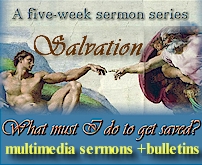|
First Sunday of Lent
(cycle a)
Humor | Peace & Justice | NexGen Worship
Clergy Finance
| Saint Patrick's Day |
Holy Week
Six Weeks of Daily Lenten Reflections, plus Easter week

Texts in Context |
Commentary:
Psalter;
First Lesson;
Epistle;
Gospel |
Prayer&Litanies
Hymns & Songs |
Children's Sermons |
Sermons based on Texts
Special DPS Resource:
Six Weeks of Daily Lenten Reflections, plus Easter week by
Nail,Bender


Sermons:
by Rev. Randy Quinn
Not By Bread Alone, Matthew 4:1,11
by Rev. Dr. David Rogne
Godís Provision of Grace,
Romans 5:12,19
by Rev. Randy L. Quinn
Out of the Garden, Genesis 2:15,17, 3:1,7
by Rev. Randy
Quinn
The Meaning of Lent,
Matthew 4:1,11
by HW in HI
So
We Enter the Wilderness
Matthew
4:1,11
by T. Hall
3 Ways to Destroy A Christian,
Matthew 4:1,11
by Gary Roth
Temptation and Obedience,
Matthew 4:1,11
by RevJan
______________________________________________________________
Immediate Gratification, Long-Term Suffering
Genesis 2:15,17; 3:1,7
by Rev. Randy Quinn
During Lent this year, we will be exploring the lives of people who
made changes in their lives; they traded one thing for another. I hope
we will hear in their stories an invitation to make changes in our
own. In fact, each sermon will end with an invitation to discipleship.
By that, I mean to offer you an opportunity to change, to trade
something in your life as we learn to walk more closely with Jesus.
Our story today is about the first man and woman, Adam and Eve, who
unintentionally traded away paradise. I say unintentionally because as
I have read their story, Iím not sure they understood what it was that
was going to happen.
I know that when most people read this story they immediately make a
leap from the story itself to the Christian doctrine of ďoriginal
sin.Ē That sin, according to people like John Wesley was about
unbelief that begot pride.1 He said it was pride that led Adam and Eve
to seek their own will rather than Godís will. From the moment they
made the choice to act on their own, they began to experience a
separation from God. Godís glory departed and they became dead to God.
God told them they would die, but as far as we know nothing had died
yet, so they wouldnít have known what death was. They simply saw the
fruit, thought it looked good, so they ate it.
What we hear in their story is the story of our lives, though, the
story of our tendency to act on impulse, the tendency to seek
immediate gratification without considering the cost.
Think about it. How many times in the past year have we heard the
statistical evidence that as a nation we have become increasingly
overweight? Obesity can be traced directly to our desire for immediate
gratification. Fast food, snack food, processed food have all made it
easy to grab something quick and easy -- and in the process our health
is suffering.
Our entire financial system has also been compromised by a desire for
short-term gains, even if it yields long term losses. Quarterly
earnings reports rather than annual reports, for example, and daily
reporting of stock market values put enormous pressure on business
leaders to make short-term decisions, to act on impulse as they
respond to the daily news rather than sound business practices.
Or think about the economic crisis that began a couple of years ago,
something that we may or may not be working our way out of today.
There were people who were borrowing beyond their budget. They wanted
to have the biggest house and the most expensive car and the fastest
boat -- and they wanted it now. So they borrowed on the future to have
their immediate desires met. But it was built on a house of cards that
came tumbling down.
[continue]
|
|
|
|